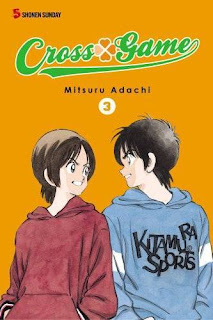Adachi continued balance of numerous genres in his works is always something that I am continuously impressed by. While one genre is always constantly in the foreground the others move sometimes silently but with purpose in the background. This leads to a slow build-up that doesn't seem rushed, but can also seem to be impossibly slow at the same time. It also leads to the quite importance that slowly builds until both parties are able to come to terms with it.
Out of all 3 of the baseball mangas Adachi has produced, I would have to rank them:
1) Touch
2) Cross Game
3) H2
And I shall explain why.
Touch struck a much deeper chord with me because of the continued trauma and grief Tatsuya goes through after Kazuya's death. I've explained this in previous posts, but I just want to show that I continue to hold Touch on top because of it. While Cross Game does portray baseball used as a tool for overcoming grief, it is not the center point in the story.
Cross Game has my favorite heroine out of Adachi's works. Aoba is the strongest lead physically and maybe mentally as well. Both her and Kou are left to endure losing the most important person in their lives, Aoba's sister and Kou's girlfriend Wakaba who dies at the tender age of 10. Wakaba's life and her influence on Kou and Aoba is the most obvious theme throughout the manga. Baseball and Wakaba seem to be the only way that these characters relate to each other at first glance.
The baseball aspect of this manga is one that I enjoyed. Aoba has a passion for baseball and is a gifted pitcher. She continues to join the baseball clubs at each of her schools, even when she cannot actually play with the team during matches. Yet she is determined and has only to answer to herself and works hard and gains the respect, and maybe some crushes, from the boys on the team. Aoba's character is the key stone to not only Kou, but to the entire baseball team. Every one of them is inspired and motivated by her natural talent and her love of a sport that she cannot fully enjoy.
On this aspect, the anime actually intensifies it by introducing a cousin of another baseball player and her involvement with a women's baseball team. I stress that it is a baseball team and not softball, they are 2 different sports. Through this introduction, Aoba is later brought to try-outs for a national women's team and introduced to other girls that are as passionate about baseball as she is. Prior to this, Aoba had always been the solitary girl and through this was slightly isolated from other girls unless they were family.
There is only 1 other manga that I know of that uses this female baseball player theme and that is Koukou Kyuuji Zawa-san, which is also a shounen geared manga.
As a reader and as a female, I really appreciated the message that this sends to other girls in Japan and was also intensified by the Japanese Women's Soccer teams amazing victory at this last years World Cup in Germany. Women's sports do not receive any real support here from the government and women's leagues are hard to come by. All of the women who had numbers over 12 on the National Team did not get paid for being a national team member or club team members. They all had outside jobs to cover their living costs. Most women's sports are showcased during the Olympics and thats about it. Hopefully women's sports are going to receive much more attention not only on a Global level, but also on a National level, where it's needed the most.
A funny point I'd like to make is that some of my favorite parts of other Adachi manga were all put into Cross Game. The rivalry between Kou and Aoba, Aoba's strength of character, and connection between Kou and Akaishi all reminded me of my favorite aspects of Rough, Katsu, and H2 respectively. Resulting in a very easy and enjoyable read for me.
Adachi Mitsuru has got to be one of the best mangaka in Japan. Not only has his career lasted over 40 years and is still going, but he has had numerous commercial successes and at least 3 of his manga given anime adaptions. In Japan, when your manga gets an anime or live action adaption, you know you have arrived. There are so few mangaka that have their careers last that long, or if it does last that long it's because they are still writing the same manga or continuations of the same world their created. Adachi is able to create different successful manga, while their will always be similarities between them and he has his own formula from his time in the business, it works.

I'm curious, does the manga for Cross Game extend past the ending of the anime?
ReplyDeleteNo, the manga and anime both end at the train station :)
DeleteThank You and that i have a swell present: Whole House Renovation Cost Calculator contractor for home renovation near me
ReplyDelete